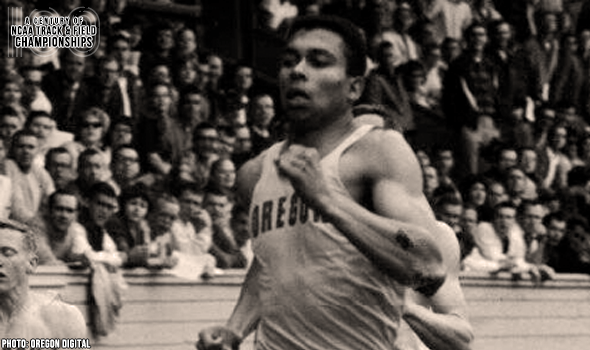
Oregon’s Jerome Sprinted To NCAA Glory
If ever a meet could have used photo-finish timing, it was the 1964 NCAA Outdoor Track & Field Championships.
The 5000 and 400 were both ruled deadlocks, but those were with merely two runners inseparable.
The 100-meter final saw three sprinters crossing the line at almost the same instant: Harry Jerome of Oregon, Edwin Roberts of North Carolina Central and Trenton Jackson of Illinois.
It took almost an hour to sort the finish, but when they did, Jerome was ruled the victor in 10.1. Roberts (second) and Jackson (third) were also credited with that same mark as well.
“Honestly, that’s one I’d hate to judge on,” Jerome said about the finish to Dick Leutzinger of the Eugene Register-Guard. “Usually I know when I win or lose. I’d hate to say on that one.”
While the 10.1 was a meet and collegiate record, it wasn’t a PR for Jerome. He still owned a share of the world record of 10.0 that he set in the summer after his freshman season back in 1960.
Jerome was a Canadian prodigy who came from great lineage. As a high school standout in North Vancouver, British Columbia, he broke a 31-year-old national record in the 220 yards. And many knew his grandfather, John Armstrong Howard, who was the first Black athlete to represent Canada in the Olympic Games.
The fact that Jerome was even running in 1964 – near his best, let alone at all – was a comeback story for the ages. Jerome tore his quadriceps tendon in the fall of 1962 at the British Commonwealth Games and the seriousness of the injury led many to believe that he would never run again. He didn’t believe that and a little over a year later, he opened the 1964 season by equaling the world indoor best in the 60-yard dash with his time of 6.0.
Then at the 1964 NCAA Championships, Jerome doubled back in the 200, taking third to lead Oregon to its second team title in three years – both at Hayward Field. The Ducks won their first national title in 1962 when Jerome won the 220 yards and was runner-up in the 100.
Not long after that, Jerome went to the Tokyo Olympic Games, where he earned his lone Olympic medal – a bronze in the 100.
Jerome died in 1982 of a brain aneurysm at age 42. In 1984, the Labatts Classic held in Burnaby was renamed the Harry Jerome Classic and in 1988 a statue of him was erected in Vancouver’s Stanley Park.
The NCAA and collegiate track & field will mark a momentous milestone in the spring of 2021 -- the 100th anniversary of the NCAA Championships and with that, the NCAA Track & Field Championships. In June 1921, the University of Chicago hosted the first track & field championships in NCAA history.
This point can’t be emphasized enough: Not only was the event the first for NCAA track & field, but the first championships for any sport under the sponsorship of the NCAA.
To celebrate, over each of the next 365 days, the U.S. Track & Field and Cross Country Coaches Association (USTFCCCA) will celebrate moments, student-athletes, and coaches that have made a century’s worth of championships special. From humble beginnings to important historical milestones to the modern-day, collegiate track & field has evolved with the American society.
The 2021 edition of the NCAA Division I Outdoor Track & Field Championships begin with preliminary round action on May 27-29 in Jacksonville, Fla., and College Station, Texas. The championships final site and culmination of the celebration is slated for June 9-12, 2021 at the newly rebuilt Hayward Field in Eugene, Ore.

Ritchie Doubles Down In The Throws
Meg Ritchie of Arizona became the first woman in the history of the NCAA Division I Outdoor Track & Field Championships to win any two events in 1982.

Three-For-Three: Woodruff Made It Look Easy
John Woodruff of Pittsburgh won three consecutive 800/880 titles at the NCAA Track & Field Championships from 1937 to 1939.

The Tie Goes To The Runner(s)
Bill Straub of Army and Jim Murphy of Air Force TIED for the 5000-meter title at the 1964 NCAA Track & Field Championships!

Ottey’s Audacious Quadruple In 1983
Merlene Ottey of Nebraska sought to win NCAA titles in the 100, 200, 400 and 4×100 relay in 1983.

He’s Great: LSU’s Davis Soars To History
Walter Davis, who turns 41 today, scored 22¼ points at the 2002 NCAA Division I Outdoor Track & Field Championship to lead LSU to the national team title.

Scott Neilson Is NCAA T&F’s Mr. Canada
Scott Neilson of Washington won four consecutive hammer throw titles at the NCAA DI Outdoor Track & Field Championships between 1976 and 1979.

A Crowning Moment For Rogers In 2017
Back in 2017, Raevyn Rogers of Oregon dazzled at the NCAA Division I Outdoor Track & Field Championships with a victory in the 800 and a sizzling anchor on the winning 4×400 relay.

Robinson Brothers Make NCAA T&F History
Can you name the first set of siblings to win NCAA Track & Field titles? We’ll give you a hint: Their last name is Robinson.

UTEP’s Nyambui Goes 7-For-7 Outdoors
Suleiman Nyambui of UTEP never lost a race at the NCAA Division I Outdoor Track & Field Championships. He went a perfect 7-for-7 over four years.

Oxy’s Gutowski Vaults To Record Heights
Bob Gutowski of Occidental won the pole vault at the 1957 NCAA Outdoor Championships with a clearance of 4.82m (15-9¾), a mark that surpassed the world record but was never ratified.

